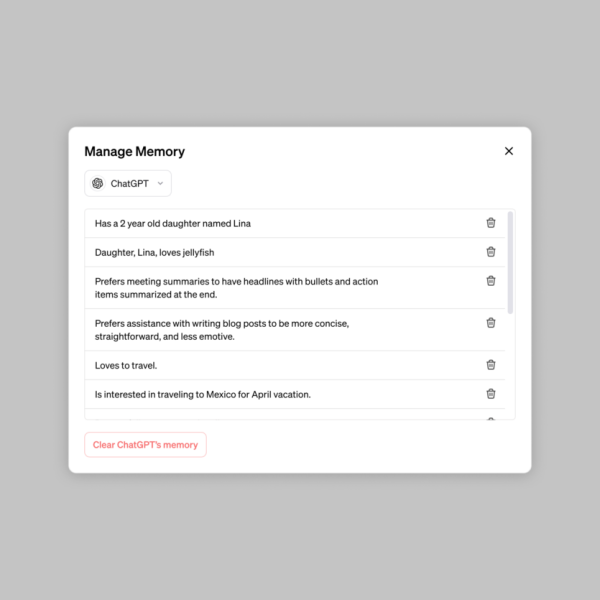ChatGPT can now remember (or forget) what you tell it.
OpenAI, as part of the test, deployed advanced settings for managing the “memory” of the chatbot – for a small part of both paid and free users.
“ChatGPT can now transfer what it learns between chats, making responses more relevant. During communication, you can ask him to remember something specific or allow him to record the details in the future. ChatGPT's memory will improve the more you use it, and you'll start to see improvements over time,” OpenAI explains in a blog post.
The update will indeed make responses more personalized – for example, if you ask to remember that you have a pet, ChatGPT will likely take that into account in queries about travel or the like.
As for business, a chatbot's memory is useful, for example, for remembering tone, voice and formatting options for blog posts, as well as programming languages and frameworks.
Special chatbots, created based on OpenAI models and available in the GPT Store, have already received their own memories. For example, Books GPT can automatically remember what books you've read and what genres you like best. But these memories are never transferred to ChatGPT – and vice versa.
The remembering feature for ChatGPT and GPT can be disabled in the settings menu. You can also erase individual memories or clear memory completely (but, please note, we are talking about memory, not query history).
Product analytics course. Become a universal analyst by using 20+ tools to work with any product. Get to know the course
We’re testing ChatGPT’s ability to remember things you discuss to make future chats more helpful.
This feature is being rolled out to a small portion of Free and Plus users, and it’s easy to turn on or off. https://t.co/1Tv355oa7V pic.twitter.com/BsFinBSTbs
— OpenAI (@OpenAI) February 13, 2024
OpenAI says it is taking measures to prevent ChatGPT from “proactively” remembering sensitive information such as health information unless the user explicitly asks for it.
Additionally, the company will launch a temporary chat option (also first in the test), which will allow you to start a dialogue from scratch – ChatGPT will not know about previous conversations and will not gain access to memory, but will carry out special instructions, if they are enabled. However, OpenAI says it may keep a copy of temporary chat conversations for up to 30 days for “security reasons.”
Meanwhile, OpenAI CEO Sam Altman compared ChatGPT to a “barely useful mobile phone” during a virtual speech at the World Government Summit.
“We don’t see as many programs that change the world as we would like,” Altman added.
OpenAI chief says that in comparison to the evolution of mobile phones, he'd like to see ChatGPT like the latest iPhone, but in an AI world.
According to Altman, OpenAI is now working on the next big AI language model, GPT-5, which is expected to be “smarter than ever.”
GPT-4 was released back in March last year, and then an improved version of GPT-4 Turbo – the most advanced AI model that OpenAI has publicly acknowledged the launch of. There were also rumors of a “secret” release of GPT-4.5.
Meanwhile, OpenAI's CEO asks the world to “be patient” and says GPT technology will get “much better within a few years.”
Join the ITS Authors Contest! Win cool prizes from our partners Logitech – professional gaming steering wheel and low-profile gaming keyboards.

